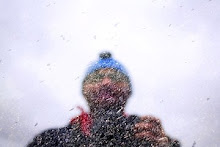It was my second full day in Ireland. I decided to take a train to fairly touristy fishing village of Howth, just north of Dublin. I met up with a German traveler and walked the streets with him, chatting for a few hours. The town, it being late December, was desolate. He decided to take the train back to Dublin.
I wanted to go down to the docks and meet some sailors.
Before long an Irish fellow waiting for his crew saw me photographing and called me over. After a few minutes of chatting, he called his skipper and arranged for me to go out with them on their fishing trip. So in two hours I hop a train back to Dublin, grab my equipment and some clothes, ride back to Howth and board the ship.
The Catherine Alice, a 27 meter Icelandic fishing boat, sat waiting for me when I walked back into Howth with my few bags. Mark, the skipper, knelt welding on the deck. Weld, one of two Egyptian sailors of the crew, caught my eye and notified Mark I had arrived. Within moments we left the port.
As night set in and we headed south, the Irish coast began to disappear. The Catherine Alice was out for prawns. She scoured the Irish sea for them day and night. The tides weren't quite right and she caught sand dogs more than anything, a bottom-feeding fish that resembles a sad looking shark. These, the crew dumped back into the sea. Most everything else they kept. But prawns were scarce.
Times are difficult in recent years for Irish fishermen. The change to the Euro has hurt fish values. Since Ireland joined the European Union, its waters were carved up and distributed to countries with larger fishing fleets. France. Spain. These countries now freely fish once Irish waters, under less-strict regulations to which the Irish are adhered.
The skipper tells me regulations governing the Irish fishing industry are the most strict in Europe. When other nations receive a slap on the wrist, an Irish fisherman is heavily fined, even receiving a criminal charges at times.
These effects trickle inland. They effect old fishing villages. Markets and families dependent on the sailor's dollar are no longer getting the same money. And the world-wide economic crisis only furthers the burden.
This is a start to an essay examining the Irish fishing industry. Soon I plan to visit more traditional fishing villages, less dependent on tourism and more on fishing, to see how the industry-dependent shops are dealing.









3 comments:
how awesome is it that you got to do this???
the third photo is my favorite. interesting post!!
chas
Classic, dude.
I'm so jealous.
Thanks guys. Hope to follow up on it for sure.
Post a Comment